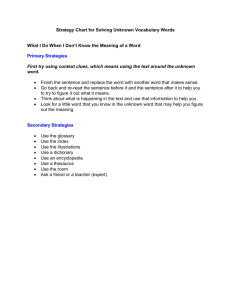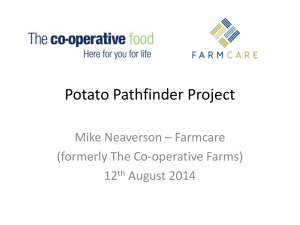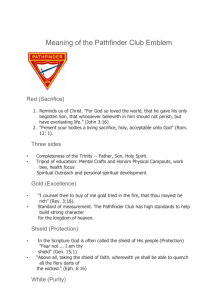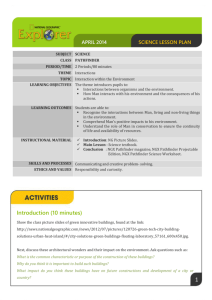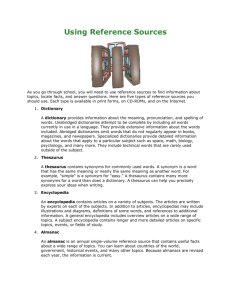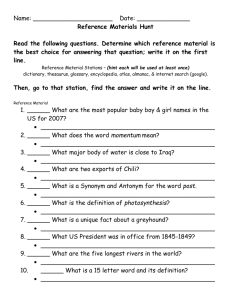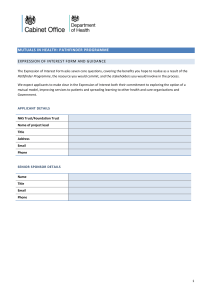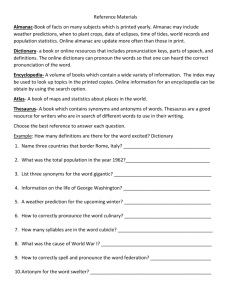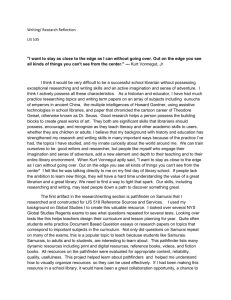Water Cycle Pathfinder - Professional Portfolio Anita K. FLuker
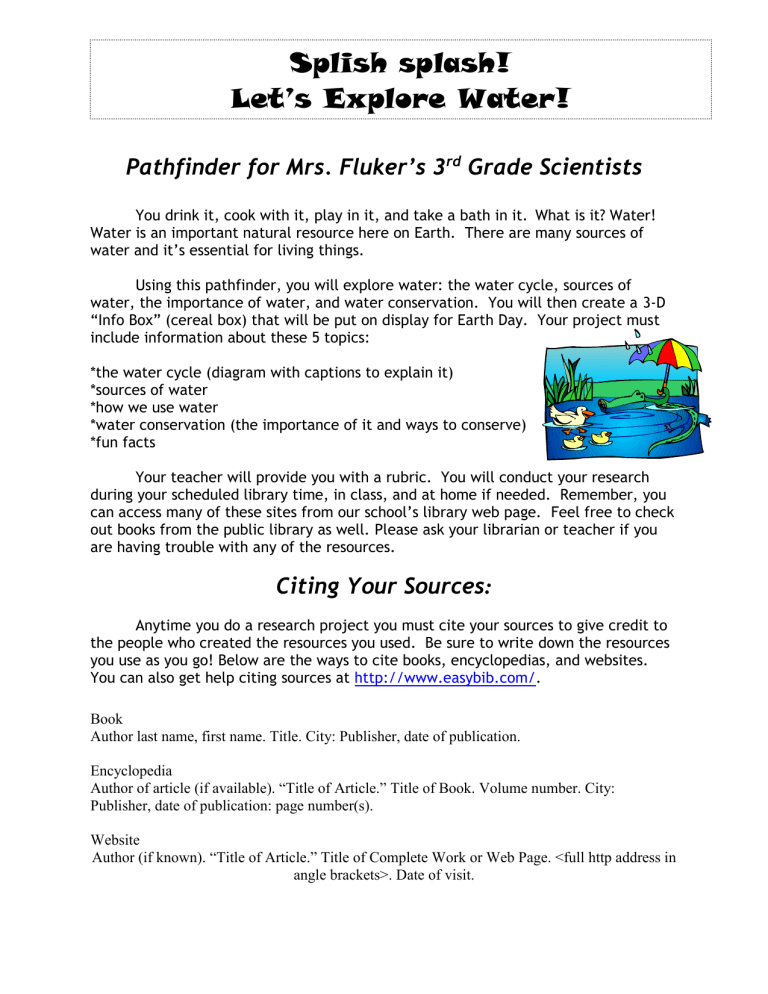
Splish splash!
Let’s Explore Water!
Pathfinder for Mrs. Fluker’s 3
rd
Grade Scientists
You drink it, cook with it, play in it, and take a bath in it.
What is it? Water!
Water is an important natural resource here on Earth. There are many sources of water and it’s essential for living things.
Using this pathfinder, you will explore water: the water cycle, sources of water, the importance of water, and water conservation. You will then create a 3-D
“Info Box” (cereal box) that will be put on display for Earth Day. Your project must include information about these 5 topics:
*the water cycle (diagram with captions to explain it)
*sources of water
*how we use water
*water conservation (the importance of it and ways to conserve)
*fun facts
Your teacher will provide you with a rubric. You will conduct your research during your scheduled library time, in class, and at home if needed. Remember, you can access many of these sites from our school’s library web page. Feel free to check out books from the public library as well. Please ask your librarian or teacher if you are having trouble with any of the resources.
Citing Your Sources
:
Anytime you do a research project you must cite your sources to give credit to the people who created the resources you used. Be sure to write down the resources you use as you go! Below are the ways to cite books, encyclopedias, and websites.
You can also get help citing sources at http://www.easybib.com/ .
Book
Author last name, first name. Title. City: Publisher, date of publication.
Encyclopedia
Author of article (if available). “Title of Article.” Title of Book. Volume number. City:
Publisher, date of publication: page number(s).
Website
Author (if known). “Title of Article.” Title of Complete Work or Web Page. <full http address in angle brackets>. Date of visit.
Pathfinder Resources:
Encylopedias:
Search: water cycle, water conservation, and water
resources.
Grolier Online Encyclopedia: http://go-kids.grolier.com
This online encyclopedia will search several encyclopedias for you.
Random House Children's Encyclopedia Ref 031 Ran
“A highly illustrated one-volume encyclopedia containing 450 main entries ranging from Aboriginal Australians to Zoos.”
The World Book Encyclopedia Ref 031 Wor
Search the “W” volume.
Dictionaries:
Look up words related to water and the water cycle:
conservation, precipitation, condensation, evaporation.
Fact Monster Dictionary: http://dictionary.factmonster.com/
Simple to use- just type in the search box and click “Go.”
Scholastic’s Children’s Dictionary Ref 423 Sch
You will find words listed in ABC order.
Merriam-Webster’s Elementary Dictionary Ref 423 Web
“A dictionary for students ages eight to twelve with meanings and uses given for more than 32,000 words.”
Ready Reference:
The Old Farmer’s Almanac for Kids: http://www.almanac4kids.com/
Click on “Weather” on the left, then search for the weather on your birthday and zip code to see if there was any precipitation on the day you were born!
Fact Monster Almanac: http://www.factmonster.com/almanacs.html
Search: “Wasting water” to find tips for water conservation. Move to p. 4 to see the percentage of Earth’s surface covered by water.
National Geographic Kids Almanac 2013 Ref 031 Nat
Search this fun almanac to look up facts about water usage and record amounts of precipitation.
Databases:
Pebble Go: http://www.pebblego.com
Click on the “Earth and Space” database, and then choose “Earth Science” to find
“All About Water.”
Find It Virginia: http://www.finditva.com
Click on “Kids Info Bits” to search “water use,” “water conservation,” and “water cycle.” See if you can find the article titled “Water in the White House” to learn which president was the first to have running water!
Library Catalog:
Beaverdam Elementary Library: http://hcps.us/bes/
Find a link to our school’s library online catalog on the library webpage. Some key words to search are: “water cycle,” “water conservation,” and “water use.”
Pamunkey Regional Library: http://www.pamunkeylibrary.org
You can also search the public library for an even larger selection of books. You will need a library card to check out books.
Government Resources:
http://ga.water.usgs.gov/edu/watercycle-kids.html
This is a good source of information from the U.S. government. It includes an interactive diagram of the water cycle from the http://water.epa.gov/learn/kids/drinkingwater/index.cfm
This site has fun activities to help you learn about the water cycle.
Water Cycle Pathfinder
Created by: Anita Fluker
12/2/13
Topic: Students will explore SOL 3.9 (the water cycle) using this pathfinder. The water cycle is a difficult concept for students to learn. The research they will do using the resources provided in the pathfinder will support and enhance what they have learned in class. The variety of resources they use will also reinforce the reference materials they have learned to use during library visits.
SOL 3.9 The student will investigate and understand the water cycle and its relationship to life on Earth. Key concepts include: a) there are many sources of water on Earth; b) the energy from the sun drives the water cycle; c) the water cycle involves several processes; d) water is essential for living things; and e) water on Earth is limited and needs to be conserved.
Introduction: This pathfinder was created for 3 rd grade students after they have studied the water cycle in their classroom. Because the resources are provided, all students should be able to locate and access a variety of reference materials to complete their research.
Struggling readers may need assistance reading encyclopedia and database articles. Care was given to provide resources appropriate for a 3 rd grade reading level. Vocabulary words that students need to know are: conservation, precipitation, condensation, and evaporation.
Students will use the resources on the pathfinder to create an “Info Box” using a covered cereal box. The 2 large sides will include a detailed diagram of the water cycle and conservation of water. The 2 narrow sides will include sources of water and uses of water.
The top will include fun facts or “Did you know?” questions. Students will also be required to include a bibliography on their box. The “Info Boxes” will be on display for Earth Day.
Collaboration: This pathfinder is meant to be a collaborative project between the librarian and classroom teacher. Before assigning the project, the librarian and teacher would meet to decide what information the students should research and include on their project, decide on the types and number of resources students should use, and create a rubric. The classroom teacher would introduce the assignment, providing clear expectations along with the rubric.
The librarian would then instruct the students on using the pathfinder and its resources. Both the teacher and librarian would be available during the students’ library time to assist as needed. After the project, the librarian would create a survey for students to evaluate the helpfulness of the pathfinder.
Impact on Student Learning: This pathfinder assignment will help students master the
Science 3.9 Standard of Learning. It will allow students the opportunity to gather, sort and organize, and evaluate information. Students will benefit from a project that integrates science, language arts, and technology. The pathfinder will also provide practice in finding, evaluating, and using reference materials so that students may carry this knowledge with them later as they conduct their own research.
Formats Used:
Encyclopedia
Dictionary
Ready Reference
(Almanac)
Both print and online encyclopedias will provide background information on the water cycle and water conservation. Students will see that an encyclopedia provides a wealth of information on a wide variety of topics and is a good starting place when conducting research to get an overview of a topic.
Both print and online dictionaries will be used to define the key terms of the water cycle and check spelling for editing the final project.
Students will practice using guide words to find the entry for which they are searching.
Almanacs will provide quick and interesting facts for students to explore about water sources and usage. Students will see that an almanac is a place to get fun facts on a wide variety of topics.
Database Students will locate articles, videos, and diagrams using key terms to search online databases. Kid-friendly databases will be provided. Also, search terms will be given to help newly-independent researchers navigate this large source of information.
Library Catalog Students will use the library catalog to access books from the school and public library to use for their project. Suggested keywords will be provided.
Government
Resources
These websites provide accurate and reliable information from government agencies.
